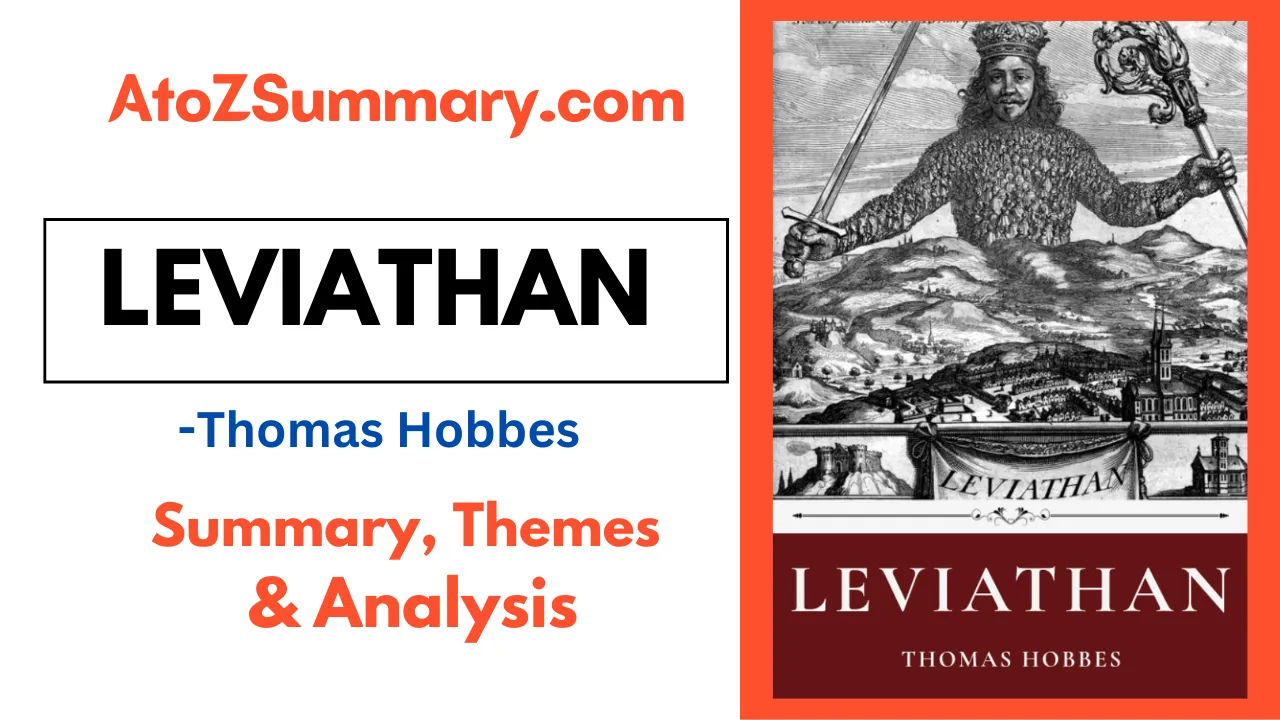| Title | Leviathan |
| Type | Book |
| Author | Thomas Hobbes |
| Year Published | 1651 |
| Genre | Philosophy, Political theory |
| Historical Context | Written during the English Civil War (1642-1651) |
| Key Ideas | Absolute sovereignty, social contract, state of nature, human nature, natural law, individualism, fear and security |
| Influence | “Leviathan” made an important contribution to political theory and had a lasting impression on Western political thought. It had an impact on the evolution of the social contract theory, the cornerstone of contemporary democracies. Hobbes’ views on human nature and the function of government have also influenced disciplines like psychology and sociology. |
| Notable Quotes | “Life in the state of nature is solitary, poor, nasty, brutish and short.” “The condition of man is a condition of war of everyone against everyone.” “The right of nature is the liberty each man hath to use his own power, as he will himself, for the preservation of his own nature; that is to say, of his own life.” |
Themes
- State of Nature: Hobbes introduces his topic by portraying the “state of nature,” a fictitious scenario in which people exist without any kind of social or governmental organization. Hobbes said that life was “solitary, poor, nasty, brutish and short” in the natural world, where there was perpetual struggle.
- Social Contract: Hobbes argues that in order to leave the state of nature, people must enter into a social compact that trades some of their personal liberties for the security and stability offered by a sovereign state. All sane political power is based on the social compact.
- Sovereignty: The ultimate authority in society, according to Hobbes, is the sovereign government, which has unrestricted ability to uphold law and defend its people. Those who violate the social compact must be held accountable, and the sovereign must have the authority to enact and execute laws as needed.
- Human Nature: Hobbes considers people to be naturally self-interested, competitive and motivated by a desire for power and a dread of dying. Lack of a powerful, centralized authority results in conflict.
- Justification for Absolute Rule: According to Hobbes, total authority by a sovereign state is the only way to stop the chaos and violence of the natural world. This defense of ultimate power has generated controversy throughout history, and political theorists continue to dispute it now.
- Freedom and Equality: Hobbes’ ideology focuses more emphasis on security and stability than it does on personal freedom and equality. Hobbes contends that in order to get protection, people must give up some of their freedom and that only the sovereign government can provide such protection.
Summary
In the view of Leviathan, developing a commonwealth through a social contract is the most effective means to achieve social harmony & civil peace. Hobbes’ ideal commonwealth is governed by a sovereign power with complete authority to ensure the common protection and responsibility for maintaining the commonwealth’s safety.
Hobbes corresponds to the commonwealth in his introduction as a “artificial person” & a body politic that mimic like the human body.
The commonwealth is portrayed as a massive human form made out of the bodies of its citizens, with the sovereign serving as its head, in the frontispiece of Leviathan’s first edition, which Hobbes assisted in creating. Hobbes refers to this figure as the “Leviathan,” which is a word that is derived from the Hebrew for “sea monster” & the name of a monstrous sea creature that appears in the Bible.
The image serves as the perfect metaphor for Hobbes’ ideal government. He makes an argument in his text that the Leviathan is essential for keeping the peace & averting civil war.
The four books that make up Leviathan are entitled as “Of Common-wealth,” “Of Man,” “Of a Christian Common-wealth” & “Of the Kingdome of Darknesse.” The entire text’s philosophical framework is found in Book 1, while the subsequent books merely develop the arguments made in the first few chapters.
As a result, Book 1 is highlighted the most in the in-depth summaries that follow. Hobbes claims that every aspect of human nature can be inferred from materialist principles in his opening chapter of his book, which explores the fundamental motions of matter.
Hobbes portrays the state of nature, also known as the natural state of man, as inherently violent and gripped by fear. The “war of every man against every man” that occurs in nature is characterised by people’s constant desire to eliminate one another. Because of how awful this situation is, people naturally seek peace, and building the Leviathan through social contract is the best way to do so. (Needs to be correct)
The construction of the Leviathan is described in Book II, along with the rights of rulers and their people, and the commonwealth’s governmental structure is intended. Book III examines how Christian doctrine squares with Hobbesian philosophy & the Leviathan’s religious structure. In Book IV, the author challenges incorrect religious beliefs and makes the case that a secure Christian commonwealth can only be attained through the political establishment of the Leviathanic state.
The philosophical approach used by Hobbes in Leviathan is modelled after a geometric proof that is built on established definitions and first principles, and in which each step of the argument draws conclusions from the step before it. After meeting Galileo during his extensive travels through Europe in the 1630s, Hobbes decided to develop a philosophical approach similarly to the geometric proof.
Hobbes attempted to develop a similarly unarguable philosophy in his writing of Leviathan by noticing that the conclusions drawn from geometry are indisputable because each of its constituent steps is indisputable in itself.
About the Author-Thomas Hobbes
| Detail | Description |
|---|---|
| Full Name | Thomas Hobbes |
| Born | April 5, 1588 |
| Died | December 4, 1679 |
| Nationality | English |
| Occupation | Philosopher, political theorist, and historian |
| Famous works | Leviathan, De Cive, Behemoth |
| Education | -Bachelor of Arts degree from Oxford University -Self-taught in mathematics, physics, and languages |
| Influences | Aristotle, Euclid, Galileo Galilei, Francis Bacon |
| Influenced by | Rene Descartes, John Locke, Francis Bacon, Aristotle |
| Ideas | Social contract theory, absolutism & materialism |
| Notable beliefs | Humans are naturally self-interested and violent, and require strong central authority to prevent chaos and maintain order. |
| Legacy | Considered one of the founders of modern political philosophy, and his ideas continue to influence debates about government, individual rights and human nature. |
FAQs
What is the main idea of “Leviathan”?
The main idea of “Leviathan” is that a strong, centralized government with ultimate power is the most effective approach to create a society that is calm and orderly. Hobbes contends that without such a government, existence would be nasty, brutish and short and that there would be perpetual warfare.
What is the significance of “Leviathan”?
Being one of the foundational works of contemporary political philosophy, it had an impact on how Western political thinking evolved and contributed to making the social contract idea a crucial part of political philosophy.
What is the “state of nature” in “Leviathan”?
The “state of nature” is Hobbes’ hypothetical scenario in which people live without any government or social order. In this state, people are naturally selfish, competitive and violent.
What is the “social contract” in “Leviathan”?
The “social contract” is the agreement that people make with the government where they agree to give up part of their own liberties and rights in exchange for safety and security.









![Little Women Summary,Themes,Characters & Synopsis [Louisa May Alcott] Little Women Summary,Themes,Characters & Synopsis [Louisa May Alcott]](https://atozsummary.com/wp-content/uploads/2023/08/Little-Women-SummaryThemesCharacters-Synopsis-Louisa-May-Alcott-1024x538.webp)

